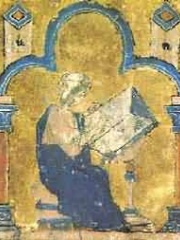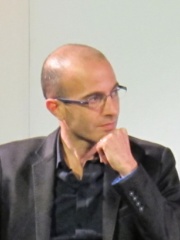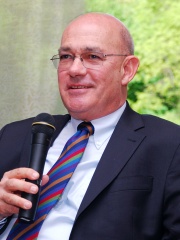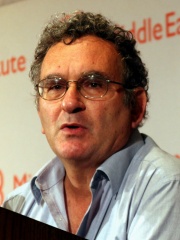





The Most Famous
HISTORIANS from Israel
This page contains a list of the greatest Israeli Historians. The pantheon dataset contains 561 Historians, 7 of which were born in Israel. This makes Israel the birth place of the 12th most number of Historians behind Egypt, and Austria.
Top 7
The following people are considered by Pantheon to be the most legendary Israeli Historians of all time. This list of famous Israeli Historians is sorted by HPI (Historical Popularity Index), a metric that aggregates information on a biography's online popularity.

1. Josephus (37 - 100)
With an HPI of 80.94, Josephus is the most famous Israeli Historian. His biography has been translated into 75 different languages on wikipedia.
Flavius Josephus (born Yosef ben Mattityahu; c. AD 37 – c. 100) was a Roman–Jewish historian and military leader. Best known for writing The Jewish War, he was born in Jerusalem—then part of the Roman province of Judea—to a father of priestly descent and a mother who claimed Hasmonean royal ancestry. He initially fought against the Roman Empire during the First Jewish–Roman War as general of the Jewish forces in Galilee, until surrendering in AD 67 to the Roman army led by Vespasian after the six-week siege of Yodfat. Josephus claimed the Jewish messianic prophecies that initiated the First Jewish–Roman War made reference to Vespasian becoming Roman emperor. In response, Vespasian decided to keep him as a slave and presumably interpreter. After Vespasian became emperor in AD 69, he granted Josephus his freedom, at which time Josephus assumed the Emperor's family name of Flavius. Flavius Josephus fully defected to the Roman side and was granted Roman citizenship. He became an advisor and close associate of Vespasian's son Titus, serving as his translator during Titus's protracted siege of Jerusalem in AD 70, which resulted in the near-total razing of the city and the destruction of the Second Temple. Josephus recorded the Great Jewish Revolt (AD 66–70), including the siege of Masada. His most important works were The Jewish War (c. 75) and Antiquities of the Jews (c. 94). The Jewish War recounts the Jewish revolt against Roman occupation. Antiquities of the Jews recounts the history of the world from a Jewish perspective for an ostensibly Greek and Roman audience. These works provide insight into first-century Judaism and the background of Early Christianity. Josephus's works are the chief source next to the Bible for the history and antiquity of ancient Israel, and provide an independent extra-biblical account of such figures as Pontius Pilate, Herod the Great, John the Baptist, James, brother of Jesus, and Jesus of Nazareth.

2. Procopius (500 - 560)
With an HPI of 76.58, Procopius is the 2nd most famous Israeli Historian. His biography has been translated into 55 different languages.
Procopius of Caesarea (; Ancient Greek: Προκόπιος ὁ Καισαρεύς Prokópios ho Kaisareús; Latin: Procopius Caesariensis; c. 500 – 565) was a prominent late antique Greek scholar and historian from Caesarea Maritima. Accompanying the Roman general Belisarius in Emperor Justinian's wars, Procopius became the principal historian of the 6th century, writing the History of the Wars, the Buildings, and the infamous Secret History.

3. William of Tyre (1130 - 1186)
With an HPI of 75.84, William of Tyre is the 3rd most famous Israeli Historian. His biography has been translated into 43 different languages.
William of Tyre (Latin: Willelmus Tyrensis; c. 1130 – 29 September 1186) was a medieval prelate and chronicler. As archbishop of Tyre, he is sometimes known as William II to distinguish him from his predecessor, William I, the Englishman, a former prior of the Church of the Holy Sepulchre, who was Archbishop of Tyre from 1127 to 1135. He grew up in Jerusalem at the height of the Kingdom of Jerusalem, which had been established in 1099 after the First Crusade, and he spent twenty years studying the liberal arts and canon law in the universities of Europe. Following William's return to Jerusalem in 1165, King Amalric made him an ambassador to the Byzantine Empire. William became tutor to the king's son, the future King Baldwin IV, whom William discovered to be a leper. After Amalric's death, William became chancellor and archbishop of Tyre, two of the highest offices in the kingdom, and in 1179 William led the eastern delegation to the Third Council of the Lateran. As he was involved in the dynastic struggle that developed during Baldwin IV's reign, his importance waned when a rival faction gained control of royal affairs. He was passed over for the prestigious Patriarchate of Jerusalem, and died in obscurity, probably in 1186. William wrote an account of the Lateran Council and a history of the Islamic states from the time of Muhammad, neither of which survives. He is famous today as the author of a historical chronicle of the Kingdom of Jerusalem. William composed his chronicle in excellent Latin for his time, with numerous quotations from classical literature. The chronicle is sometimes given the title Historia rerum in partibus transmarinis gestarum ("History of Deeds Done Beyond the Sea") or Historia Ierosolimitana ("History of Jerusalem"), or the Historia for short. It was translated into French soon after his death, and thereafter into numerous other languages. Because it is the only source for the history of twelfth-century Jerusalem written by a native, historians have often assumed that William's statements could be taken at face value. However, more recent historians have shown that William's involvement in the kingdom's political disputes resulted in detectable biases in his account. Despite this, he is considered the greatest chronicler of the crusades, and one of the best authors of the Middle Ages.

4. Yuval Noah Harari (b. 1976)
With an HPI of 71.50, Yuval Noah Harari is the 4th most famous Israeli Historian. His biography has been translated into 65 different languages.
Yuval Noah Harari (born 1976) is an Israeli medievalist, military historian, public intellectual, and popular science writer. He is a professor of history at the Hebrew University of Jerusalem. His first bestselling book, Sapiens: A Brief History of Humankind (2011) is based on his lectures to an undergraduate world history class. His other works include the bestsellers Homo Deus: A Brief History of Tomorrow (2016), 21 Lessons for the 21st Century (2018), and Nexus: A Brief History of Information Networks from the Stone Age to AI (2024). His published work examines themes of free will, consciousness, intelligence, happiness, suffering and the role of storytelling in human evolution. In Sapiens, Harari writes about a "cognitive revolution" that supposedly occurred roughly 70,000 years ago when Homo sapiens supplanted the rival Neanderthals and other species of the genus Homo, developed language skills and structured societies, and ascended as apex predators, aided by the First Agricultural Revolution and accelerated by the Scientific Revolution, which have allowed humans to approach near mastery over their environment. Furthermore, he examines the possible consequences of a futuristic biotechnological world in which intelligent biological organisms are surpassed by their own creations; he has said, "Homo sapiens as we know them will disappear in a century or so". Although Harari's books have received considerable commercial success since the publication of Sapiens, his work has been more negatively received in academic circles. In 2019, Yuval Noah Harari and his husband, Itzik Yahav, founded Sapienship, a social impact company that advocates for global responsibility. Their mission is to tell and retell the shared story of humanity in order to promote trust and cooperation between all people. The company focuses on research, content development, education, and the publication of position papers on global challenges in the fields of technology and the future world order. Sapienship has also launched an official educational Instagram page.

5. Sextus Julius Africanus (160 - 240)
With an HPI of 66.14, Sextus Julius Africanus is the 5th most famous Israeli Historian. His biography has been translated into 35 different languages.
Sextus Julius Africanus (c. 160 – c. 240; Ancient Greek: Σέξτος Ἰούλιος ὁ Ἀφρικανός or ὁ Λίβυς) was a Christian traveler and historian of the late 2nd and early 3rd centuries. He influenced fellow historian Eusebius, later writers of Church history among the Church Fathers, and the Greek school of chroniclers.

6. Tom Segev (b. 1945)
With an HPI of 59.12, Tom Segev is the 6th most famous Israeli Historian. His biography has been translated into 16 different languages.
Tom Segev (Hebrew: תום שגב; born March 1, 1945) is an Israeli historian, author and journalist. He is associated with Israel's New Historians, a group critical of many of the country's traditional narratives.

7. Benny Morris (b. 1948)
With an HPI of 57.25, Benny Morris is the 7th most famous Israeli Historian. His biography has been translated into 20 different languages.
Benny Morris (Hebrew: בני מוריס; born 8 December 1948) is an Israeli historian. He was a professor of history in the Middle East Studies department of Ben-Gurion University of the Negev in the city of Beersheba, Israel. Morris was initially associated with the group of Israeli historians known as the "New Historians", a term he coined to describe himself and historians Avi Shlaim, Ilan Pappé and Simha Flapan. Morris's 20th century work on the Arab–Israeli conflict and especially the Israeli–Palestinian conflict has won praise and criticism from both sides of the political divide. Despite regarding himself as a Zionist, he writes, "I embarked upon the research not out of ideological commitment or political interest. I simply wanted to know what happened." One of Morris's major works is the 1989 book The Birth of the Palestinian Refugee Problem, 1947–1948 which, based on then recently declassified Israeli archives, demonstrated that the 1948 exodus of Palestinian refugees was in large part a response to deliberate expulsions and violence by forces loyal to Israel, rather than the result of orders by Arab commanders as had often been historically claimed. Scholars have perceived an ideological shift in Morris's work starting around 2000, during the Second Intifada. Morris's perspective has been described as having become more conservative and more negative towards Palestinians, viewing the 1948 expulsions as a justified act.
People
Pantheon has 7 people classified as Israeli historians born between 37 and 1976. Of these 7, 3 (42.86%) of them are still alive today. The most famous living Israeli historians include Yuval Noah Harari, Tom Segev, and Benny Morris. The most famous deceased Israeli historians include Josephus, Procopius, and William of Tyre.
Living Israeli Historians
Go to all RankingsYuval Noah Harari
1976 - Present
HPI: 71.50
Tom Segev
1945 - Present
HPI: 59.12
Benny Morris
1948 - Present
HPI: 57.25
Deceased Israeli Historians
Go to all RankingsJosephus
37 - 100
HPI: 80.94
Procopius
500 - 560
HPI: 76.58
William of Tyre
1130 - 1186
HPI: 75.84
Sextus Julius Africanus
160 - 240
HPI: 66.14

